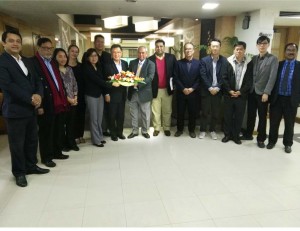Political uncertainty over upcoming national election, its effect on private investment, rising food inflation, sluggish exports and remittance, and a lack of corporate governance in banks are the key challenges Bangladesh will face in 2018, said a think-tank yesterday.
The Dhaka-based South Asian Network on Economic Modelling (Sanem) mentioned the challenges and reflected on the performance of Bangladesh’s economy until the end of 2017 in its quarterly review. Selim Raihan, executive director of the research organisation, presented a keynote on the economy’s condition at a programme at Brac Centre Inn in Dhaka.
It said the business-as-usual scenario would not help when it comes to generating productive employment, making growth inclusive, accelerating reduction in poverty rate, developing human capital and achieving the Sustainable Development Goals. The government should prioritise education, health and social sector investment, speedy implementation of infrastructure projects within justified cost estimates, and reform measures with respect to trade, industrial and macro policies and institutions, it said.
The think-tank said a rising economic growth rate since 2012-13 has been largely driven by government expenditure. But sluggish private investment and rise in public investment continued.
The share of public investment was one-fourth of the total investment in 2016-17 from 16.5 percent in 2008-09.
“Stimulating the private sector investment still remains a big challenge,” the report said.
The country witnessed a falling growth rate in exports until 2016-17. However, it grew 6.86 percent year-on year in the July-November period of the current fiscal year. The prospect of rising export growth in 2018 depends on both domestic and external factors.
On the domestic front, there are problems of policy-induced and supply-side constraints.
According to Sanem, the real effective exchange rate (REER) is still highly appreciated compared to the country’s competitors. Between 2012 and 2016, the REER of Bangladesh with respect to US dollar appreciated 22.3 percent. “Further adjustment in the nominal exchange rate will be obvious given the scenario of high import demand and slowdown in export and remittance growth.”
However, mere devaluation of the nominal exchange rate will not be enough for getting the REER right, said Sanem in the report.
“There is a need for necessary measures for export growth by addressing the domestic competitiveness issues as well as for product and market diversification.” Bangladesh witnessed a falling growth rate in remittance until 2016-17. However, in July-November, it grew 10.10 percent compared to the same period a year ago.
According to the World Bank’s recent projection, remittances to low and middle-income countries are on course to recover after two consecutive years of decline.
“This means that there is a brighter prospect for Bangladesh in 2018,” said Sanem. The think-tank also touched upon the rice price situation.
There has been a surge in import of rice in recent months. Import of rice amounted to only Tk 35.70 crore in July-September of 2016-17 compared to Tk 2,912.1 crore in the same period of the current fiscal year.
In the first three months of 2017-18, rice import was five times that in the same period a year ago. “Rice prices are still high and on the rise despite imports.” Using a computable general equilibrium model, it found a 35 percent increase in the price of rice and the results show that poverty rate may go up 0.32 percentage points due to the rice price rise this year.
Sanem suggested a “rice policy” with respect to production, import, supply management and strategic agreements with rice exporting countries. On poverty situation, the report said the annual reduction in overall poverty rate was 1.8 percentage points in 2000-2005, which declined to 1.7 percentage points during 2005-2010, and further fell to 1.2 percentage points during 2010-2016.
The most alarming trend is that, while the annual reduction in extreme poverty rate was 1.8 percentage points during 2000-2005, it declined to 1.5 percentage points in 2005-2010 and 0.8 percentage points in 2010-2016. “This suggests that the scope and success in reducing overall and extreme poverty rates in Bangladesh have become limited in recent years.”
With the business-as-usual growth rate of GDP, Bangladesh will have an overall and extreme poverty rate of about 10 percent and 4 percent respectively by 2030, according to Sanem’s estimates. Even with an accelerated average economic growth rate of 8 percent, overall and extreme poverty rates will be around 6.5 percent and 2 percent respectively by 2030.
Despite accelerated economic growth in recent years, there has been much slower progress in poverty reduction because of slow employment generation, poor public spending on education and health and growing inequality. The research organisation was concerned about the scams in the banking sector and a rise in nonperforming loans. “These are reflections of weak regulation, political patronage, and a lack of vision.”
The Banking Companies (Amendment) Act-2017, which has allowed up to four family members to be in a bank’s board of directors for nine consecutive years, will increase the fragility of the banking sector further. “There is a need for a political will, proper regulation, empowering Bangladesh Bank, and speedy trial of the financial crimes.”

